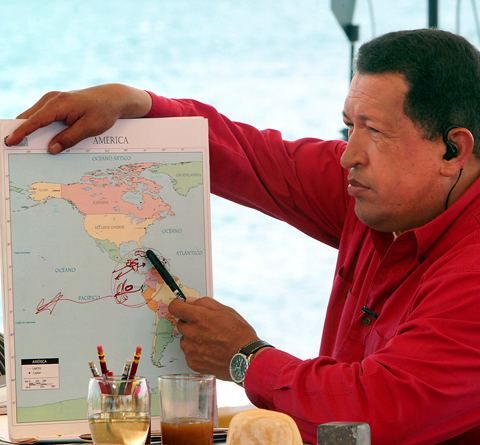Venezuelan President Hugo Chavez on Sunday dispatched the navy to Venezuela’s seaports, warning that state governors who challenge a new law bringing transportation hubs under federal control could end up in prison.
Speaking during his weekly television and radio program, Chavez ordered naval vessels to seize control this week of Port Cabello in Carabobo State and Maracaibo Port in Zulia State — two of Venezuela’s largest seaports.
Then he singled out the opposition-sided governors of those states — Carabobo Governor Henrique Salas and Zulia Governor Pablo Perez — and told military officers they might decide to flout the newly approved law.

PHOTO: AFP
“If he gets smart ... that deserves prison,” Chavez said of Salas. “The same goes for the governor of Zulia.”
Lawmakers loyal to Chavez voted last week to bring all airports, highways and seaports under federal control, a move government adversaries said was designed to expand the president’s power.
“This is a national security issue,” Chavez said on Sunday, defending the law.
The socialist leader accused “corrupt” governors of allowing drug smuggling through airports and seaports previously under their administration to thrive and he promised a government crackdown.
“We’ve given drug trafficking tough blows, but we must recognize that they still have some bases in the ports and airports,” Chavez said.
Opposition governors warned that the law approved last week by the Chavista-dominated National Assembly is designed to strangle the president’s foes financially and to undermine support from constituents who elected them in November.
Under the law, states and municipalities can no longer collect tariffs at transportation hubs or establish tolls along highways, meaning governors and mayors will have less money for local public projects.
Also on Sunday, Chavez said that Russian bombers would be welcome in Venezuela, but the socialist leader denied that his country would offer Moscow territory for a military base.
Chavez — a fierce critic of Washington, with close ties to Russia and Cuba — said his government did not raise the possibility, as Russian media had reported.
“It’s not like that,” the president said, responding to a report by Interfax news agency quoting the chief of staff of Russia’s long range aviation, Major General Anatoly Zhikharev, as saying some strategic bombers could be based on an island offered by Venezuela.
Zhikharev reportedly said on Saturday that Chavez had offered “a whole island with an aerodrome, which we can use as a temporary base for strategic bombers.”
Speaking during his weekly television and radio program, Chavez said he told Russian President Dmitry Medvedev that his nation’s bombers would be allowed to land in Venezuela if necessary, but no such plans had been made.
Venezuela hosted two Russian Tu-160 bombers in September for training flights and joined Russian warships two months later for naval exercises in the Caribbean.

When Shanghai-based designer Guo Qingshan posted a vacation photo on Valentine’s Day and captioned it “Puppy Mountain,” it became a sensation in China and even created a tourist destination. Guo had gone on a hike while visiting his hometown of Yichang in central China’s Hubei Province late last month. When reviewing the photographs, he saw something he had not noticed before: A mountain shaped like a dog’s head rested on the ground next to the Yangtze River, its snout perched at the water’s edge. “It was so magical and cute. I was so excited and happy when I discovered it,” Guo said.

TURNAROUND: The Liberal Party had trailed the Conservatives by a wide margin, but that was before Trump threatened to make Canada the US’ 51st state Canada’s ruling Liberals, who a few weeks ago looked certain to lose an election this year, are mounting a major comeback amid the threat of US tariffs and are tied with their rival Conservatives, according to three new polls. An Ipsos survey released late on Tuesday showed that the left-leaning Liberals have 38 percent public support and the official opposition center-right Conservatives have 36 percent. The Liberals have overturned a 26-point deficit in six weeks, and run advertisements comparing the Conservative leader to Trump. The Conservative strategy had long been to attack unpopular Canadian Prime Minister Justin Trudeau, but last month he

Chinese authorities said they began live-fire exercises in the Gulf of Tonkin on Monday, only days after Vietnam announced a new line marking what it considers its territory in the body of water between the nations. The Chinese Maritime Safety Administration said the exercises would be focused on the Beibu Gulf area, closer to the Chinese side of the Gulf of Tonkin, and would run until tomorrow evening. It gave no further details, but the drills follow an announcement last week by Vietnam establishing a baseline used to calculate the width of its territorial waters in the Gulf of Tonkin. State-run Vietnam News

THIRD ANNIVERSARY OF WAR: Ursula von der Leyen said that Europe was in Kyiv because ‘it is not only the destiny of Ukraine that is at stake. It’s Europe’s destiny’ A dozen leaders from Europe and Canada yesterday visited Ukraine’s capital to mark the third anniversary of Russia’s invasion in a show of support for Kyiv by some of its most important backers. European Commission President Ursula von der Leyen and Canadian Prime Minister Justin Trudeau were among the visitors greeted at the railway station by Ukrainian Minister of Foreign Affairs Andrii Sybiha and the president’s chief of staff Andrii Yermak. Von der Leyen wrote on social media that Europe was in Kyiv “because Ukraine is in Europe.” “In this fight for survival, it is not only the destiny of Ukraine that is